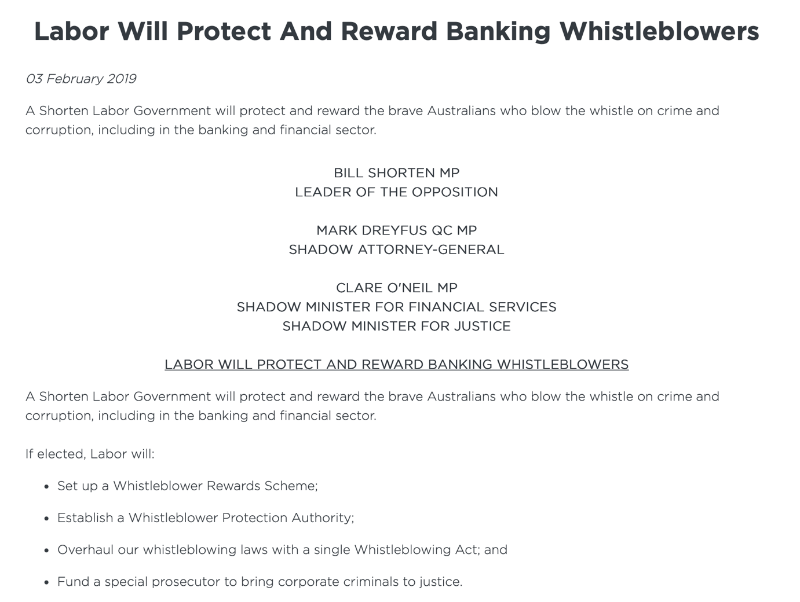A bill to establish a Whistleblower Protection Authority is before a Senate Committee, and submissions are in. But will the Labor Government finally act? Rex Patrick reports.
The Whistleblower Protection Authority Bill 2025 (WPA) has been tabled in the Senate by Senators David Pocock and Jacqui Lambie. Its purpose is to serve as a one-stop shop for the giving of advice to both whistleblowers and investigators, and step in when a whistleblower protection issue arises.
The then Labor opposition promised to establish a WPA during the 2019 federal election campaign. Once in Government, though, not much has been done by Labor to make it happen.

Instead, in their last term, all the Labor Government did was prosecute public sector whistleblowers such as David McBride and Richard Boyle, and did nothing to assist corporate sector whistleblowers such as Tony Watson and Christian Reiche.
David v Goliath battle for whistleblower tackling Lendlease, PwC in court
Richard Boyle and a WPA
MWM has reported extensively on Australian Tax Office (ATO) whistleblower Richard Boyle. In May this year, he had no choice but to timidly plead guilty to being a whistleblower and will face court again in August to find out his fate. Here’s hoping he does not get burdened with a conviction.
How would a WPA have helped Richard?
Richard, like so many whistleblowers, had never before blown the whistle. He had little knowledge of what to do.
In good faith, he prepared his public interest disclosure, collecting evidence needed to support his case. He broke the law, not knowing that his copying of protected information was not protected under the Public Interest Disclosure Act (it took four judges, three King’s Counsels, and a number of barristers and lawyers to work out he wasn’t protected).
It’s not clear that a WPA would have had a definitive answer on Richard’s conduct – legal hindsight is a wonderful thing – but it is reasonable to say that had Richard contacted the WPA, it would have cautioned against the approach he was planning on taking. Indeed, the WPA could have assisted him to ensure that his preparation carried out for his public interest disclosure was squeaky clean.
It is accepted by the Senate and the SA Court of Appeal that the ATO botched the investigation of Richard’s disclosure. Perhaps a different approach would have been taken in the investigation had Richard made his disclosure to the WPA and the WPA had then referred it to the ATO. Richard could have been given anonymity, and the ATO would likely have taken the investigation more seriously.
Richard, undeterred by the botched ATO investigation, took his disclosure to the Inspector-General of Taxation (IGT). Whilst that was logically sound on account of the IGT’s expertise in tax, it had no jurisdiction to deal with his disclosure. Richard should have gone to the Ombudsman. A WPA could have advised him of this.
Retribution
It was only after the ABC 4Corners program, Mongrel Bunch of Bastards, was set to report on the issue raised in Richard’s disclosure that retribution commenced. On 4 April 2018, the Australian Federal Police raided Richard’s home on behalf of the ATO. On 10 April 2018, Mongrel Bunch of bastards aired. In May 2018, the ATO terminated his employment.
On 7 January 2019, he was charged with 66 offences.
Richard commenced a fight for his liberty, one that is still ongoing. He had no ability to direct time and resources to dealing with the ATO’s retribution.
If there had been a WPA, Richard would have had the ability to call for their support. It could have investigated the ATO to see whether they had engaged in the pursuit of Richard for improper reasons (embarrassment of the ATO as opposed to a genuine concern over illegal activities engaged in his preparation to blow the whistle).
The WPA could have made a recommendation to the Attorney-General to have the charges against Richard dropped.
The WPA would have facilitated access to legal support and expertise.
It’s fair to say that the charges against Richard may never have been laid if there was a WPA standing beside him throughout the entire process. Indeed, it may even have been the case that ATO officials could have themselves been disciplined or charged in respect of their failures under the Public Interest Disclosure Act and even for misfeasance.
Richard Boyle’s case has seen hundreds of media articles written that have undermined public confidence in Australia’s whistleblower protection regime. WPA involvement and intervention could have had the opposite effect, giving confidence to others who observe wrongdoing in their workplace.
Government reluctant to act?
Almost 50 submissions have been made to the Senate inquiry, mostly supportive, many with suggestions for improvements.
The Attorney-General’s Department’s submission is probably the most instructive on the Government’s position on the Bill. It states, “The Government is considering the WPA Bill”, but then goes on to say “the establishment of a Whistleblower Commissioner or Authority would raise significant legal, operational and resourcing issues that require careful consideration.”
It does not instil confidence.
Boeing death a stark reminder of the need for a Whistleblower Authority
At least five separate parliamentary inquiries have lent support to a WPA. There are WPA equivalents in countries such as Ireland, the Maldives, the Netherlands, Slovakia, Spain and the US.
And yet, a government that is content to blow billions upon billions on defence projects is reluctant to spend a dime protecting whistleblowers, such that no one wants to risk wrongdoing inside public and private organisations.
The government seems to fail to appreciate that it is the cost of not having a WPA that needs to be considered most.
And living up to an election promise.
Rex Patrick is a former Senator for South Australia and, earlier, a submariner in the armed forces. Best known as an anti-corruption and transparency crusader, Rex is also known as the "Transparency Warrior."

